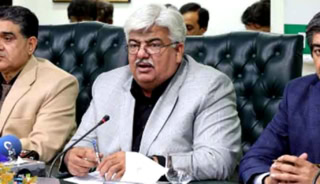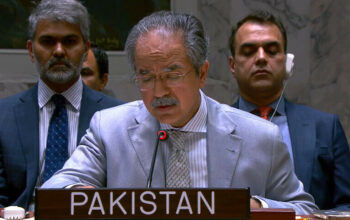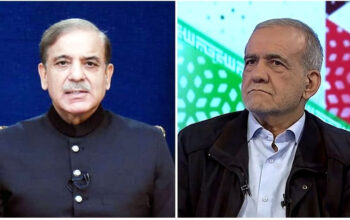By Staff Reporter
ISLAMABAD: The United States is pressing India and Pakistan to find a “responsible solution” to the crisis sparked by an attack in occupied Kashmir, which New Delhi blames on Islamabad, while Pakistan denies involvement and seeks an impartial probe.
The April 22 assault in Pahalgam, which killed more than two dozen people, has inflamed relations between the nuclear-armed neighbours.
“This is an evolving situation, and we are monitoring developments closely. We have been in touch with the governments of India and Pakistan at multiple levels,” a US State Department spokesperson told Reuters in an emailed statement.
“The United States encourages all parties to work together towards a responsible resolution.”
While voicing support for India, Washington has stopped short of censuring Pakistan. “We stand with India and strongly condemn the attack in Pahalgam,” the spokesperson said. The remarks echo recent statements from US President Donald Trump and Vice President JD Vance.
Indian Prime Minister Narendra Modi, a Hindu nationalist leader, has pledged a fierce response, vowing to hunt the attackers “to the ends of the earth” and warning that those behind the strike “will be punished beyond their imagination.”
His rhetoric has intensified calls within India for military action against the nuclear arch-rival, raising fears of further escalation.
Analysts suggest that Washington’s deepening ties with India and its focus on other global crises may temper its involvement in the dispute.
“India is now a much closer U.S. partner than Pakistan,” said Michael Kugelman, a South Asia expert at Foreign Policy magazine. “This may worry Islamabad that if India retaliates militarily, the U.S. may sympathize with its counter-terrorism imperatives and not try to stand in the way.”
The US views India as a vital ally in countering China’s growing clout in Asia, a partnership that has strengthened in recent years, Kugelman said. Pakistan, though still a US ally, has seen its strategic significance wane since the American withdrawal from Afghanistan in 2021.
The Trump administration, preoccupied with Russia’s war in Ukraine and Israel’s conflict in Gaza, may leave the two nations to manage the crisis initially, he added.
Hussain Haqqani, a former Pakistani ambassador to the US and a senior fellow at the Hudson Institute, agreed, observing a lack of US enthusiasm for mediation.
“India has a longstanding grievance about terrorism emanating or supported from across the border. Pakistan has a longstanding belief that India wants to dismember it. Both work themselves into a frenzy every few years. This time there is no US interest in calming things down,” Haqqani said.
The Muslim-majority region of Kashmir, claimed in full by both Hindu-majority India and Pakistan but divided between them, has been a perennial source of strife since their partition in 1947. The two nations have fought three wars, two over the Himalayan territory.
Tensions have surged since the recent attack, claimed by a little-known group, Kashmir Resistance, also known as The Resistance Front.
In retaliation, Pakistan has barred Indian airlines from its airspace, while India has suspended the 1960 Indus Waters Treaty, a critical pact governing the sharing of the Indus River and its tributaries. Both sides have also traded fire across their de facto border, the Line of Control, shattering four years of relative quiet.
Copyright © 2021 Independent Pakistan | All rights reserved




